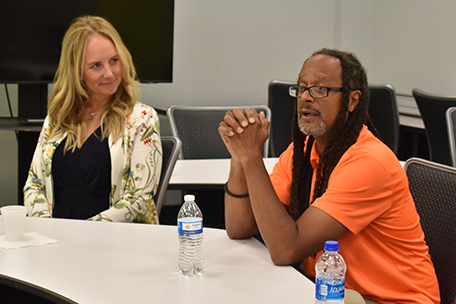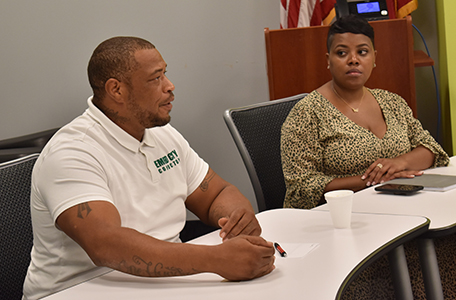YOUNGSTOWN, Ohio – Gaining access to capital and to connections can be difficult for Black-owned businesses. But a variety of public and private resources is available – many operating in collaboration with one another.
Among them is the Ohio MBAC at YBI, which assisted Mitchell’s C and C. It serves clients in Ashtabula, Trumbull, Mahoning, Columbiana, Jefferson, Belmont and Monroe counties. The MBAC program is offered by the Ohio Department of Development.
“We want to put folks in a position to be successful,” says Lydia Mihalik, ODOD director, who visited the MBAC at YBI July 20, where she met with MBE-certified business owners assisted by the center.

The Ohio Department of Development recently released $5 million in micro-enterprise loan programs targeted to minority-owned businesses. The program provides loans of up to $45,000.
“One of the biggest challenges that small businesses and minority-owned businesses have is access to capital, and we see that as a barrier to growth,” Mihalik says. “We wanted to make sure that we had a program that could be supportive of those businesses. And we know that smaller loans are very important to those businesses as they look to get started or they’re looking to expand.”
The department also cut in half the amount of paperwork required for MBE certification, Mihalik says.
“That does not mean that the integrity of the certification has been impacted at all. But there’s really no reason to show somebody 20 times over that you actually own the business and you have control of the business,” Mihalik says. “We’ve also improved the technology so that it’s easier to actually go through the process.”
Keland Logan of Youngstown – like Mitchell, one of the entrepreneurs who participated in the July 20 forum with Mihalik – secured MBE certification in June for his business, Emerald City Construction Co. LLC. The certification has opened bidding opportunities for federal and state jobs. His clients include the Trumbull County Land Bank. One of the jobs Emerald City is looking at is for the National Park Service in Cleveland.
The company’s certification followed a six-month process.

“It really makes me look at my business and how we were operating,” Logan says. “The process was super-beneficial from that standpoint alone.”
The Youngstown MBAC will focus this fiscal year, which started July 1, on getting entrepreneurs certified through the state so they can bid on the 15% set aside for minority- and women-owned enterprises, says Stephanie Gilchrist, director of the Youngstown MBAC.
On average, state agencies spend $5 billion with Minority Business Enterprise – or MBE – certified businesses, according to Gilchrist.
“What we want to do is make sure that our region is able to benefit from that dollar amount,” she says.
AFTER CERTIFICATION
MBE certification is just one of the ways that the center at YBI assists black-owned businesses. The office is working to home in on the various programs and initiatives once business owners are certified. Among these is the OhioBuys program, a portal set up for companies to bid on contracts that provide the state with goods and services.
“Some people have the misconception that the state only looks for contractors who can do construction work or architectural work. But in actuality they look for folks who can provide professional services as well,” Gilchrist says.
The MBAC office offers workshops and programs to inform minority-business owners about the resources available to them and to help secure certifications.
The office recently partnered with the Youngstown/Warren Regional Chamber to host a matchmaker event to connect MBEs with potential customers.
Earlier this year, the Regional Chamber launched a diversity, equity and inclusion program. Although the chamber is among the largest in the state, approaching 3,000 members, officials there recognized “huge lacks” in minority business representation and questioned why, according to Shea MacMillan, economic development projects director.
“It’s becoming more important and more valuable to business in general,” MacMillan says.
Economic development projects inquiries increasingly include questions about local DEI strategies and what opportunities exist for working with “equitable and diverse organizations.” Site scoring also includes such factors, he says.
The DEI committee, made up of both chamber board members and nonboard members, helps the chamber to address its approach to the issue. The committee meets weekly, MacMillan says.
ACCESS TO CAPITAL
One of the largest demands the MBAC office receives is for access to capital. It works with private lenders such as Huntington National Bank, Chase Bank and PNC Bank. C and C recently secured capital through Valley Partners, another local economic development agency.
Columbus-based Huntington National Bank, which has branches across northeastern Ohio and western Pennsylvania, launched its $100 million Lift Local Business Program in 2020, an initiative that supports minority-, woman- and veteran-owned business with planning help, financial education and other services. The $36.5 million in booked loans through the program as of early May 2022 includes $11.8 million for Black-owned businesses.
The initiative is one component of Huntington’s $40 billion strategic community plan, which has a $2 billion focus on lending to minority-owned businesses or businesses operating in majority-minority communities.
The plan is geared around strengthening small businesses and fostering economic justice in under-resourced communities, says Sam Huston, Mahoning Valley community president for Huntington.
“We are extremely focused on diversity, equity and inclusion. This is a program of work that’s been going on for quite some time within the bank,” Huston says.
Although the program was part of Huntington’s strategic plan before the COVID-19 pandemic hit in early 2020, the social justice protests following the death of George Floyd led to “obvious calls for a greater focus on social equity,” he says.
“This is where some of our feedback came from our colleagues, partners and clients” who “openly shared their thoughts and ideas,” Huston says. “In some cases, that stuff was a little bit painful to hear but it became a set of opportunities for us.”
THE WEALTH GAP
In October 2020, Chase Bank made a $30 million racial equity commitment to help close the racial wealth gap. The five-year commitment includes lending, equity and direct funding to help small businesses grow, support diverse suppliers and build a more diverse and inclusive workforce, as well as promote sustainable home ownership and expand affordable housing.
To support the bank’s racial equity commitment, Chase has hired 40 senior business consultants and more than 100 new community managers across the country, says Stephanie Gostomski, vice president, regional communications. Since the program began, Chase has mentored more than 1,000 small-business owners, she says.
“There’s a lot of resources here locally for businesses to take advantage of and to help them matriculate from the infancy stage of their business to being more mature and thriving,” says Toussaint Blake, Youngstown community manager with Chase.
When Chase launched the program, bankers thought access to capital would be the No. 1 need for Black entrepreneurs. But Laura Gibbons, senior banking consultant, says the issues seem to be more structural in nature.
“It was more about products. It was more about tools that they could use to help streamline the business,” she says. “It’s really a host of different things and the resource piece was the most important because a lot of business owners just don’t know what is available to them.”
Chase also works with community organizations as community development financial institutions and keeps the businesses it mentors advised of grant opportunities, she says.
WARREN CONNECTION
The city of Warren contracts with YBI’s MBAC to assist minority entrepreneurs. The city began working with YBI on minority-business assistance in 2018, when it provided matching funds for a state grant, says Mike Keys, city community development director. “The scope of work was much, much smaller,” he says.
According to its agreement with the city, services the YBI office provides include developing forms to monitor, track and implement minority-owned business programs; securing management and technical assistance for such businesses; and conducting outreach forums such as matchmaking events and workshops on contracting and procurement opportunities.
The goal is to generate economic activity for minority-owned businesses. Specific objectives include increasing the number of minority-owned businesses competing for procurement dollars and the number of awards received from identified anchor institutions.
To that end, MBAC will host a panel discussion Aug. 18 at Brite Energy Innovators at Warren focused on helping minority businesses land contracts and secure access to capital, Gilchrist says.
YBI is doing a good job but Warren should be doing more, 6th Ward Councilwoman Cheryl Saffold says. “We should have a person designated specifically to do the task, as we’ve had in the past,” she says.
Years ago, during the administration of Mayor Hank Angelo, Warren hired an MBE coordinator after Fred Harris, Angelo’s safety service director, found from his research that the city did “very little business” with businesses owned by women and minorities, Harris recalls. The city discontinued the post under Mayor Mike O’Brien, he says.
Harris also had city council put through an ordinance setting goals for purchasing goods and services from such businesses.
The city, Trumbull County and local school districts all can do more to help minority-owned businesses, which often have difficulties securing contracts when they have to bid against operations that have been in business for years, Harris asserts.
“They spend a lot of money on discretionary business,” he says. “They should actively look for minority- and women-owned businesses to deal with under discretionary business.”
The city of Youngstown contracts with consultant and entrepreneur Carmella Williams to operate its minority business outreach initiative, including the microenterprise grant program.
“In addition to just giving money, we also provide technical assistance,” Williams says. She conducts workflow assessments with clients and helps them to develop “a whole game plan” based on the information collected.
Additionally, her office helps clients write business plans, put together websites and assists with contacts, she says. So far, the office has done 81 assessments and action plans for city businesses and five business plans.
“It just depends on what the client needs,” Williams says. “We also offer seminars once a month that are based on what we see clients needing.”
Pictured at top: Stephanie Gilchrist directs the Minority Business Assistance Center at YBI.
